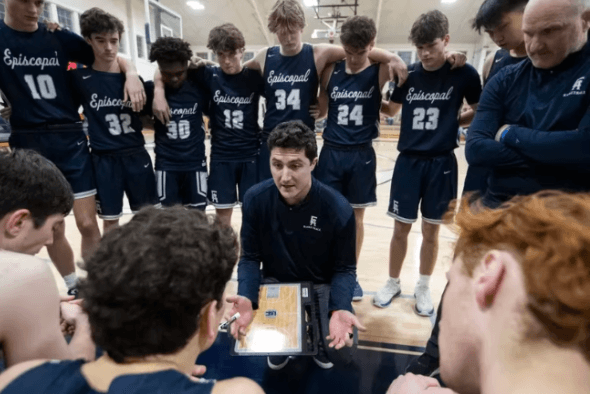Elizabeth Hug ‘25
Since he was a fourth-grader, The Episcopal Academy has been an exceedingly important aspect of Mr. Taylor Wright’s life. He was a varsity tri-athlete during his high school career: a quarterback on the football team, starting forward on the basketball team, and both a middle-infielder and pitcher on the baseball team. Sports have surrounded him for his entire life as a result of being the eldest son of a family that greatly prioritizes athletics, so athleticism and competition run in his blood.
One major influence he had was his grandfather, who loved baseball himself. “My grandpa was a big baseball guy. We had a big backyard at their house, so we would play big wiffle ball games as a family,” Wright recalls. He started playing little-league baseball around the age of four and explains, “I wanted to be a major-league baseball player when I was a little kid.” He soon became prominent on the team during his four-year career on EA’s Varsity Baseball Team. He played with several future major-league players, so a significant amount of talent surrounded him. EA’s baseball team went on to beat Malvern in PAISSAs one year, which is a core memory of Wright’s due to the fact that the Friars did not record a single hit.
Wright was an essential contributor not only to the baseball team but also to the basketball team. Since his father, Jay Wright, was the renowned college basketball coach at Villanova University who led the Wildcats to 18 NCAA tournament docks and two championship victories, basketball is naturally in his lineage. He played on the varsity squad for three seasons, leading the Churchmen in scoring, rebounds, and assists his senior season with an average of seventeen points, thirteen rebounds, and five assists. “I definitely didn’t listen as much to my dad as I should have as a high schooler. But as you get older, you learn that things like keeping a positive attitude and work ethic are what it really takes to be good,” Wright says. He now tries to incorporate his dad’s mentality into his own coaching at EA. “I teach what I know, and a lot of what I know comes from growing up around my dad. The biggest thing he always preaches is attitude; that’s his bread and butter. So obviously that’s something I heard all the time growing up, and I know it works from my own experience.”
Wright returned to EA to give back to the community that helped him achieve success as a student-athlete. He now teaches ninth-grade history, coaches the Varsity Boys’ Baseball and Basketball teams, and coaches Middle School Football. Ian Ferrell ’25 says, “It’s difficult to be a student-athlete because in addition to classes, you have athletics, so you take up most of your time that you could be doing homework to play sports, but EA makes it easy for us.” Wright is able to help his players balance the two disciplines as both a scholar and an athlete himself, especially since he experienced the same environment when he attended EA. Given that Brown is an Ivy League institution, his time spent at EA extensively prepared him for juggling sports and academics: “Because of Episcopal’s rigor, college was almost easier. I am so happy that I went to Episcopal because college was so easy, and it allowed me to focus on the things that I really liked because I was so prepared for school. You’re used to having to do a lot of schoolwork on top of your sports.”

Photo Courtesy fo Brown University Athletics
Under Wright’s coaching, mentality is given a significant priority. Tyler Beaulieu ’24, who plays both baseball and basketball for Wright, remarks, “He forces us to be the best versions of ourselves, and he challenges us when we lose focus on being good people, and being competitive, and doing the right thing. His ability to get the best out of us makes him such a great coach and leader.” One of Wright’s newer recruits, Langston Foster ’25, adds, “He stresses attention to detail and the little things. He’s also closer to my age, so he’s more personable and easier to connect with.” The feeling is mutual for Wright as he finds it easier to coach EA’s remarkably intelligent and driven student-athletes. Wright’s primary coaching objective is that his athletes remember the lessons that he taught them, and he hopes those lessons will help them in their future jobs, families, and personal lives.
When asked which of his qualities set him apart from others as an athlete, Wright explained, “Well I was just tall, so that helped. But also as a guy who played three sports, I just wanted to compete all the time. A lot of guys were better than me at all the other sports, but if we’re keeping score in any sport, I want to beat you in it.”
Wright continued his athletic career after high school by playing baseball at Brown University. He was outstanding in his senior year, finishing third on the team with 38.2 innings played and 28 total strikeouts. He explains, “The academics were a huge part for me. I also liked that Brown played very impressively ranked teams across the country because we got the chance to play guys like Aaron Nola, which was really cool. Brown also gave me an opportunity to play basketball there too.”
After his time at Brown University, he became an assistant baseball coach at Villanova. He also attended their graduate program and earned an MBA there. Later, he pursued a career in finance and didn’t give baseball much thought. However, three years later, a chance presented itself when Wright attended an alum event hosted by Brown’s baseball team. Wright recalls, “My friends and I were messing around with the radar gun to see how hard we could throw still. And when I was in college, I might have hit 90 miles an hour maybe three times. But my first pitch was around 80. The next pitch was 82. The next pitch was 84. And by my fifth pitch, I was throwing every pitch 90 miles an hour…After the alumni day, I found a minor-league team that was hosting an open tryout, which went really well. I went to spring training, made the team, and then I played for three more years.”
He developed a reputation as one of independent professional baseball’s most trustworthy pitchers with the Evansville Otters. He had a team-high eight outings, posting a 1.50 ERA, 15 strikeouts, and just three walks. “Minor-league baseball is the most fun I’ve ever had in my life. You just get to do your favorite thing all the time, and someone pays you to do it. It’s a dream come true,” Wright explained. “But you really have to love it. You have to love competing and playing the sport. I would say the biggest lesson I learned in professional baseball is that you only stay alive in that business if you can find a way to get your job done. I learned that that no matter how I feel, I can get the job done.” He believes that the lesson he gained from his experience as a minor-league player also applies to his roles as a coach and teacher: “Hey, I’ve got 40 tests to grade, but I know I can do it because of what I learned playing sports.”
This season, Wright’s main goal for the culture of EA’s Varsity Boys Basketball teams is: “As long as we play harder than the other team, we can accept the result, win or lose.” He is more concerned with his players’ attitudes and commitment to succeeding than with the final score. Wright has flourished as a coach and a teacher at EA since his return, carrying on his father’s legacy as a coach and drawing on his experience playing baseball at Brown University and in the minor leagues.

Photo Courtesy of The Philadelphia Inquirer